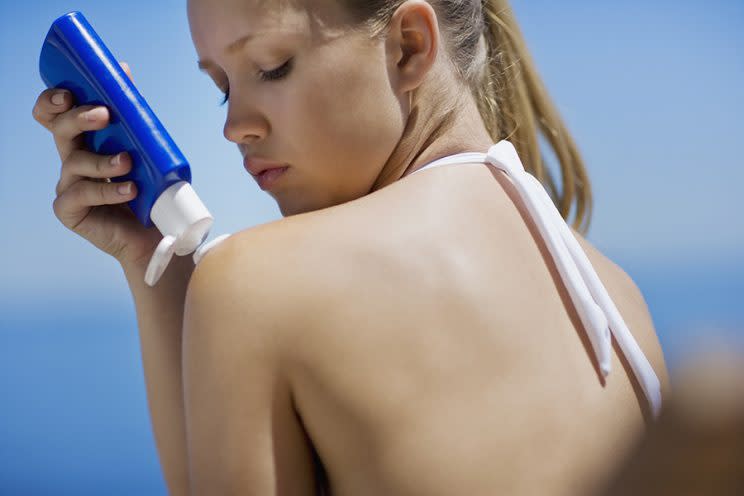Is the Popular Sunscreen Ingredient Avobenzone Harmful?

Sunscreen can be a lifesaver when it comes to shielding your skin from cancer-causing UV rays. But can certain ingredients in sunscreen be harmful? Possibly.
Researchers at Lomonosov Moscow State University in Russia looked at the stability of the popular chemical sunscreen ingredient avobenzone and found that it can break down into potentially hazardous chemicals when it reacts to chlorinated water and UV radiation, according to a study published in the journal Chemosphere.
The researchers noted that the substance in itself is safe, according to EurekAlert; however, their study did show that avobenzone has the potential to break down into hazardous chemical compounds in certain situations, such as in chlorinated water. “On the basis of the experiments one could make a conclusion that a generally safe compound transforms in the water and forms more dangerous products,” one of the study authors, Albert Lebedev, told EurekAlert. Yahoo Beauty reached out to the study authors for a comment, but has not yet heard back.
However, according to a 2017 sunscreen report by the Environmental Working Group (EWG), avobenzone only scores a 2 on its “hazard score” scale (of 1 to 10, with 10 being the most harmful), compared with oxybenzone, which gets an 8. The EWG also states that avobenzone provides the “best UVA protection of chemical filters,” with very little skin penetration and no evidence of hormone disruption — a concern for certain sunscreens like oxybenzone, which apparently “acts like estrogen in the body,” according to the EWG.
So what should you take away from all of this?
Dermatologist Jeremy Fenton of Schweiger Dermatology in New York City explains to Yahoo Beauty: “Avobenzone is a chemical sunscreen. Although it is considered safe, it can trigger allergic reactions in some people. It is not a stable chemical when used alone, so any sunscreen is going to have other chemical sunscreens added that act to stabilize the avobenzone, thus adding to the amount of chemicals you are applying on your skin.”
He continues: “Those chemicals can also have their own side effects. As mentioned in the [study], avobenzone may break down into other chemicals, but one must also realize that our own sweat combines with chlorine in pools to create volatile chemicals that can be harmful to inhale and come into contact with.”
That said, you should not — repeat not — ditch your sunscreen. “The best sunscreen is the one that you are going to use,” says Fenton. “Sunscreen can prevent skin cancer, which can be deadly. Therefore, although there may be some theoretical risk to applying a chemical to the skin, it would not be advised to go without sunscreen and risk skin cancer (a known risk) in order to avoid a possible (and unclear) risk from this chemical.”
You also don’t have to use chemical sunscreens and can opt for a physical sunblock, such as zinc oxide, instead.
“If people are looking to avoid chemicals, I recommend using a sunscreen with zinc oxide as the active ingredient,” Fenton says. “This is a full-spectrum sunscreen that is photostable — so it doesn’t degrade without stabilizers like the avobenzone. I recommend a concentration of at least 5 percent or higher of the zinc oxide. Titanium dioxide can also be added to zinc sunscreens for added SPF, but it won’t protect as well against the full spectrum of sunlight.”
Fenton concludes: “Although avobenzone has been shown to be safe, those concerned about the low risk of exposure to chemicals might want to use a zinc-based sunscreen.”
Read more from Yahoo Beauty + Style:
Scientists Created a Treatment That Can Make Skin Tan Without the Sun
The Doctor’s Appointment That You Can’t Afford to Miss This Summer
Follow us on Instagram, Facebook, and Pinterest for nonstop inspiration delivered fresh to your feed, every day. For Twitter updates, follow @YahooStyle and @YahooBeauty.


